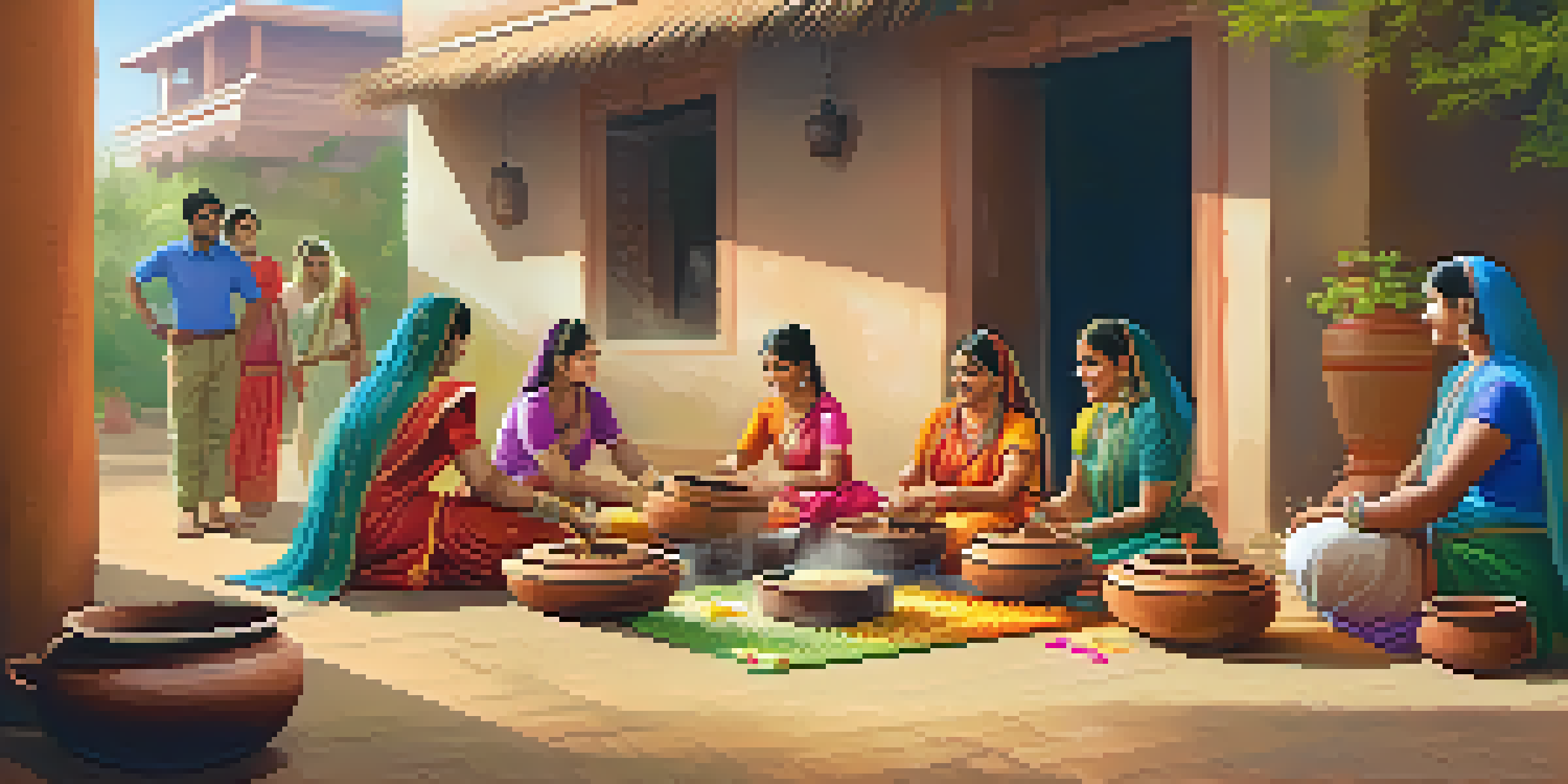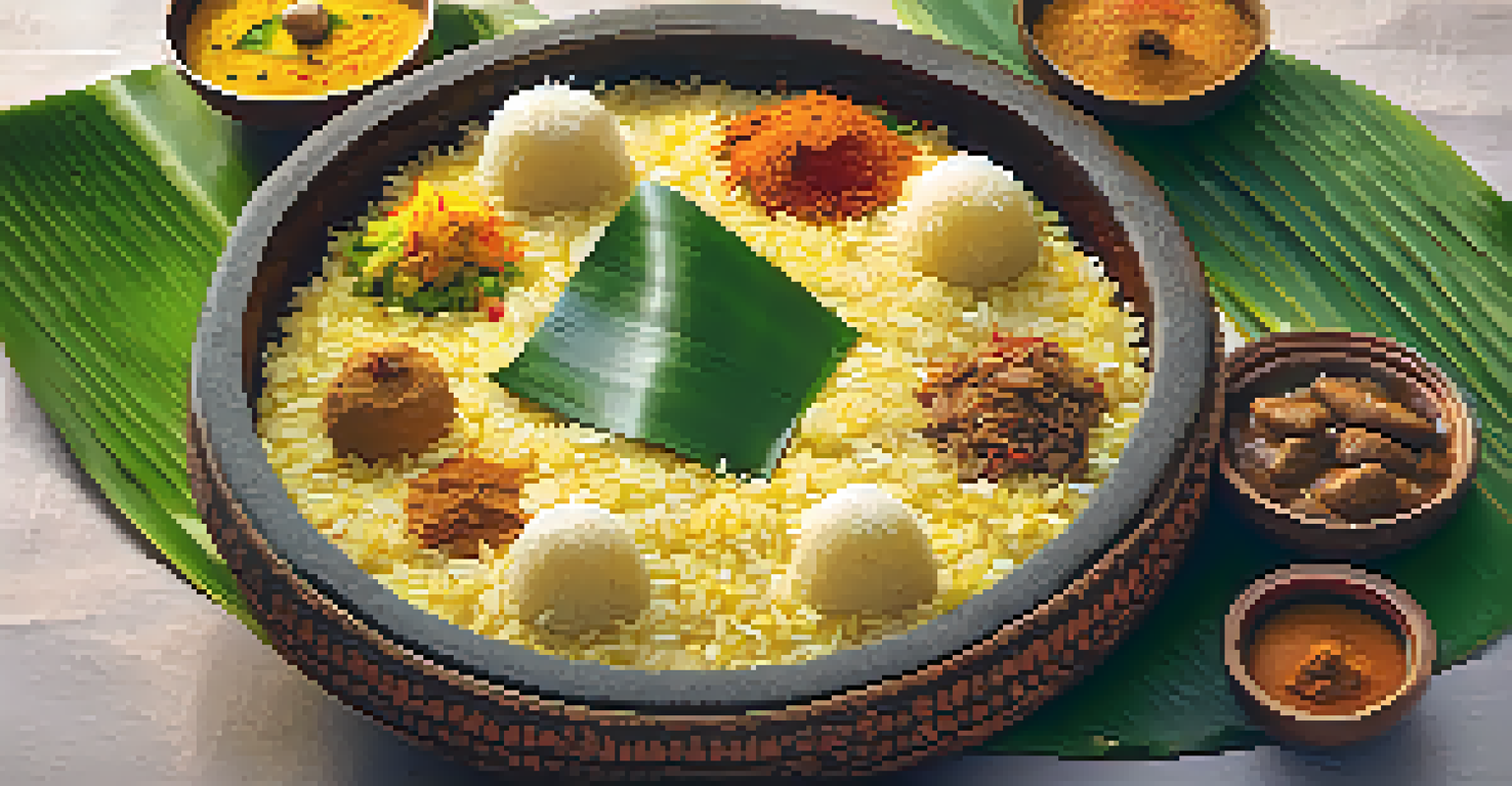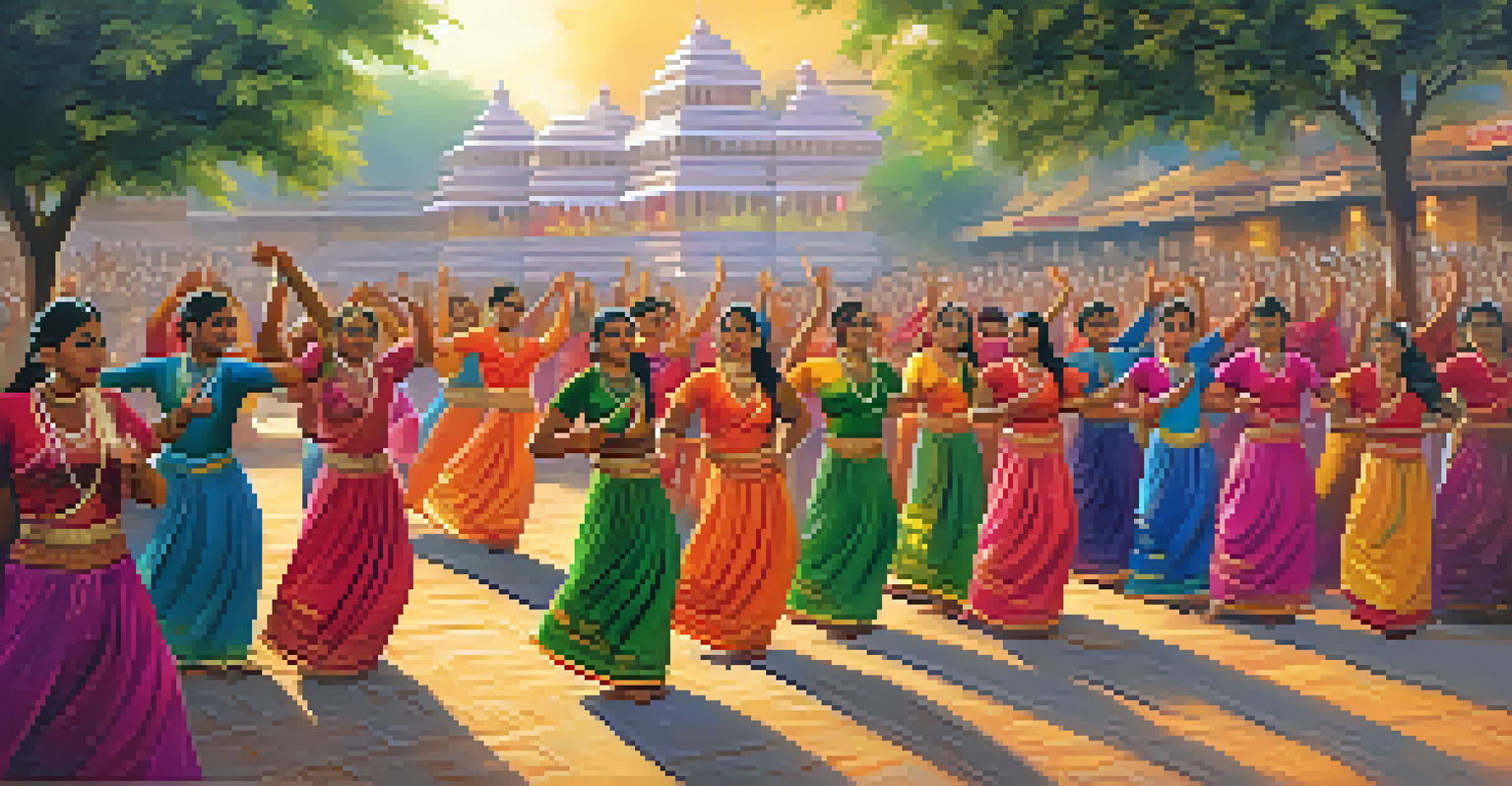Pongal: A Festival of Light and Abundance in Tamil Nadu

Understanding Pongal: A Harvest Festival of Joy
Pongal is a vibrant and joyous festival celebrated primarily in Tamil Nadu, marking the harvest season. Rooted in agrarian traditions, it symbolizes gratitude towards nature and the sun for bountiful crops. The festival usually spans four days, each dedicated to different rituals and celebrations.
Harvest is not just about the crops; it's about the community that comes together to celebrate the fruits of their labor.
The name 'Pongal' itself means 'to boil over', referring to the preparation of a special dish made from newly harvested rice, jaggery, and milk. This dish is cooked in new clay pots, symbolizing abundance and prosperity. The festival, deeply embedded in Tamil culture, brings families together to celebrate their harvest and express gratitude.
Pongal is not just a celebration of agricultural success, but also a time to reflect on the values of community and togetherness. Families often decorate their homes, wear traditional attire, and gather for joyous festivities, making it a cherished time in their lives.
The Four Days of Pongal: A Festive Journey
Pongal is celebrated over four days, each with its unique significance and rituals. The first day, Bhogi Pongal, is dedicated to discarding old belongings and sparking new beginnings. People light bonfires to burn waste, symbolizing the end of the old and the arrival of the new.

The second day, Surya Pongal, is the main day of the festival when the famous Pongal dish is prepared. Families gather to cook the rice, and the first pot to boil over is considered a good omen. This day honors the sun god, Surya, who is believed to bless the harvest.
Pongal: A Celebration of Harvest
Pongal is a vibrant festival in Tamil Nadu that celebrates the harvest season and expresses gratitude towards nature.
The third day, Mattu Pongal, is dedicated to honoring cattle, especially cows and bulls, which play a crucial role in agriculture. Farmers adorn their animals with colorful decorations and prepare special meals for them, showing gratitude for their hard work. The fourth day, Kaanum Pongal, is more about socializing and visiting friends and relatives.
Rituals and Traditions: A Cultural Extravaganza
The rituals during Pongal are steeped in tradition and culture. One of the most notable is the preparation of the Pongal dish itself, which is often cooked outdoors in front of the house. Families create colorful kolams (rangoli) at their doorsteps, welcoming guests and deities into their homes.
Food is not just what we eat; it is a way to share love, culture, and tradition.
Another tradition is the worship of tools and equipment used in agriculture. On Mattu Pongal, farmers clean and decorate their plows and other farming tools, showcasing respect for their hard work and the significance of these instruments in their lives.
Additionally, the festival is a time for cultural expressions through folk dances, music, and traditional games. Events like Jallikattu, a traditional bull-taming sport, are also held, showcasing the region's rich heritage and community spirit.
The Significance of Pongal in Modern Times
While Pongal has deep agricultural roots, its significance has evolved in modern times. Today, it is celebrated by Tamils around the world, transcending geographical boundaries. The festival brings people together, fostering a sense of community, regardless of where they are.
In urban areas, Pongal has adapted to modern lifestyles, with people celebrating in different ways. Many engage in community events, participate in cultural programs, and even hold virtual gatherings to observe the festivities with loved ones far away.
Four Days of Festive Rituals
The festival spans four days, each dedicated to unique rituals that symbolize new beginnings, honoring the sun god, cattle, and socializing.
Moreover, Pongal serves as a reminder of the importance of sustainability and gratitude towards nature. As we celebrate abundance, it encourages individuals to reflect on responsible living and the need to protect our environment for future generations.
Food and Feast: The Heart of Pongal Celebrations
Food plays a central role in Pongal celebrations, with the highlight being the sweet and savory Pongal dish. Made from freshly harvested rice, jaggery, and milk, it is a symbol of abundance and prosperity. Families often prepare a variety of other traditional dishes to accompany the main dish, reflecting the richness of Tamil cuisine.
During the festival, it’s common to see elaborate feasts laid out, showcasing the culinary skills of families. From spicy curries to delightful sweets, these meals are not just food; they represent love, care, and the joy of sharing with others.
The communal aspect of dining during Pongal is crucial, as families and friends come together to enjoy meals. This shared experience fosters bonds and creates lasting memories, reinforcing the festival's essence of unity and togetherness.
Cultural Expressions: Dance, Music, and Festivities
Pongal is not just about food and rituals; it is a vibrant celebration of culture and art. Traditional music and dance play a significant role during the festivities, with performances often showcasing folk traditions. Dancers adorned in colorful attire perform energetic folk dances, inviting everyone to join in the celebration.
Moreover, the festival is an opportunity to showcase local artisans and craftspeople. Many towns host fairs where artisans display their work, ranging from pottery to textiles, allowing visitors to appreciate the rich craftsmanship that Tamil Nadu is known for.
Pongal's Global Cultural Impact
Pongal has evolved into a global celebration, uniting Tamil communities worldwide while retaining traditional customs and values.
This cultural expression through art and performance adds a lively spirit to the festival, making it a joyous occasion. It brings together people of all ages and backgrounds, reinforcing the idea that Pongal is a communal celebration at its heart.
Pongal Around the World: A Global Celebration
Pongal has transcended its regional roots to become a global festival celebrated by Tamils around the world. From the United States to Canada, Australia to the UK, communities come together to honor their heritage and share the joy of Pongal. These celebrations often incorporate local customs while retaining traditional elements.
In many countries, events are organized in parks or community centers where families gather to prepare Pongal dishes, participate in cultural activities, and enjoy performances. This sense of community creates a home away from home for many expatriates, reinforcing their cultural identity.

The global celebration of Pongal reflects the adaptability and resilience of Tamil culture. As Tamils continue to spread their traditions across borders, Pongal serves as a reminder of the rich heritage and the importance of community, no matter where one may be.